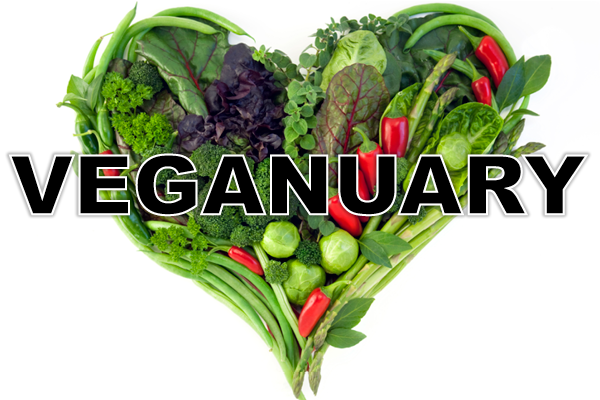19 Jan Tips for Veganuary

New year, new start and each January increasing numbers of people are choosing to quit all animal products and go vegan. So we thought we would put together some nutritional tips for Veganuary.
A plant-based diet can have enormous health benefits. However, it’s important not to stick to Oreos and oven chips. A balanced diet rich in an assortment of fruit, vegetables, wholegrains, nuts and pulses is essential to get all the nutrients needed for health and wellbeing.
Vegan virtues
Vegan diets usually contain higher levels of fibre and lower saturated fat and cholesterol contents. They tend to be richer in vitamins including C, E and folic acid as well as the minerals potassium and magnesium. Research confirms that, on average, people who eat a plant-based diet are thinner with lower blood pressure and cholesterol, as a result their risk of heart disease may be significantly decreased. Those on a vegan diet may also have a lower risk of some cancers
Nutritional challenges
It’s not just as easy as cutting out the animal products and piling up the veggies. Meat, fish, eggs and dairy products all provide essential nutrients. Getting the maximum benefit from a vegan lifestyle involves research and planning. Vegans may not get sufficient dietary protein and they may struggle to have enough of the micronutrients iron, vitamin B12, calcium, vitamin D and omega-3 fatty acids from diet alone. However, with care and attention you can optimise your nutrition. Here are some nutritional tips for Veganuary:
Protein
Protein is essential for the growth and repair of muscle and other body tissues. Many animal products are rich in protein, but they are not the only source of this important nutrient. Top up levels of protein by eating:
- Nuts
- Pulses such as lentils and chickpeas
- Legumes such as beans, alfalfa, peas and peanuts
- Soy based products like tofu
Omega-3 fatty acid
Omega-3 is the reason that our grandparents had to swallow a spoonful of cod-liver oil every day. Our bodies can’t make this vital micronutrient, so we have to obtain sufficient amounts from our diet. Research suggests that Omega-3 can maintain brain health and may lower cholesterol, protect against heart disease and decrease your risk of diabetes and cancer. The good news is that it’s not only found in fish, plant sources include:
- Nuts and seeds such as walnuts, pumpkin seeds and flax seed
- Oils derived from nuts and seeds like rapeseed
- Green leafy vegetables such as kale and spinach
- Soya and all soya products
Iron
Iron is important for building healthy red blood cells. As a vegan, you will miss out on easily accessible iron sources such as beef, lamb and dark meat in poultry. Low iron can lead to anaemia, which will leave you tired, weak and breathless. Boost your iron intake by tucking into:
- Leafy green vegetables like broccoli
- Dried fruits such as apricots, prunes and raisins
- Fortified breakfast cereals
- Nuts and seeds
- Ensure you have plenty of Vitamin C from citrus fruits or juices – this will help your body absorb more iron from the plant sources in your diet
Vitamin B12
Vitamin B12 is another micronutrient that is vital for the production of red blood cells. It also has other important functions including; maintaining the health of the nervous system and releasing essential energy from the food you eat. Vegans can get B12 in:
- Fortified breakfast cereals (check the labels to see if B12 has been added)
- Soya milk drinks can also have extra B12 added
- Yeast extract spreads and drinks like Marmite
Calcium
Calcium helps to keep your teeth and bones strong. Dairy produce is the major source of this mineral, however, it can also be found in:
- Leafy green vegetables – broccoli and kale
- Pulses – peas and beans
- Tofu
- Fortified milk-type drinks made from nuts, soya and oats
- Fortified bread
- Sesame and flax seeds
- Dried fruit such as prunes, sultanas and apricots
Vitamin D
Vitamin D works with calcium to maintain bone strength. Our bodies can actually manufacture this vitamin in the presence of sunlight but the gloomy climate, sunscreen, dark skin and lives spent indoors mean that many people are deficient. A supplement can be a good idea if you are at risk of deficiency, however you can also increase the vitamin D in your diet with:
- Fortified breakfast cereals
- Fortified fat spreads
A healthy, plant-based diet can help you lose weight, improve your health, protect against disease and even slash the amount of medication you need to control some chronic health conditions. However, a vegan lifestyle is about more than the food you eat. Veganism is described as ‘A philosophy and way of living which seeks to exclude—as far as is possible and practicable—all forms of exploitation of, and cruelty to, animals for food, clothing or any other purpose’ – that includes the products you use on your skin; AproDerm® Emollient Cream, AproDerm® Gel, AproDerm® Ointment and AproDerm® Barrier Cream are all suitable for vegans and approved by the Vegan Society, so you can stick to your ethical ideals and still keep your skin soft, smooth and healthy.



Sorry, the comment form is closed at this time.